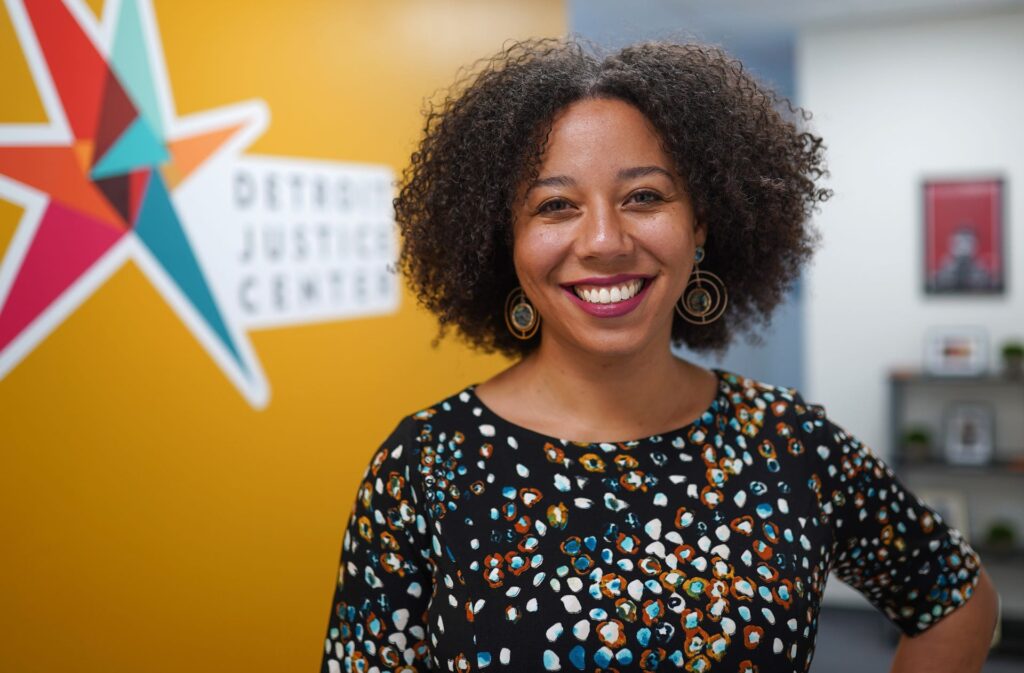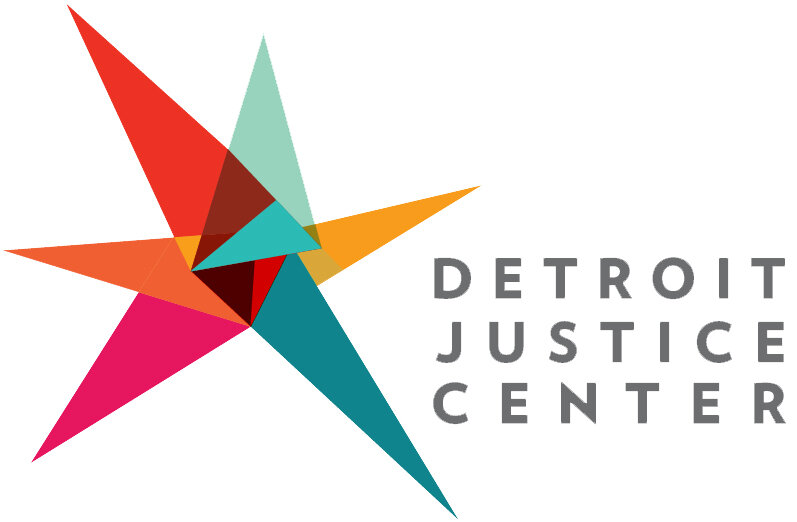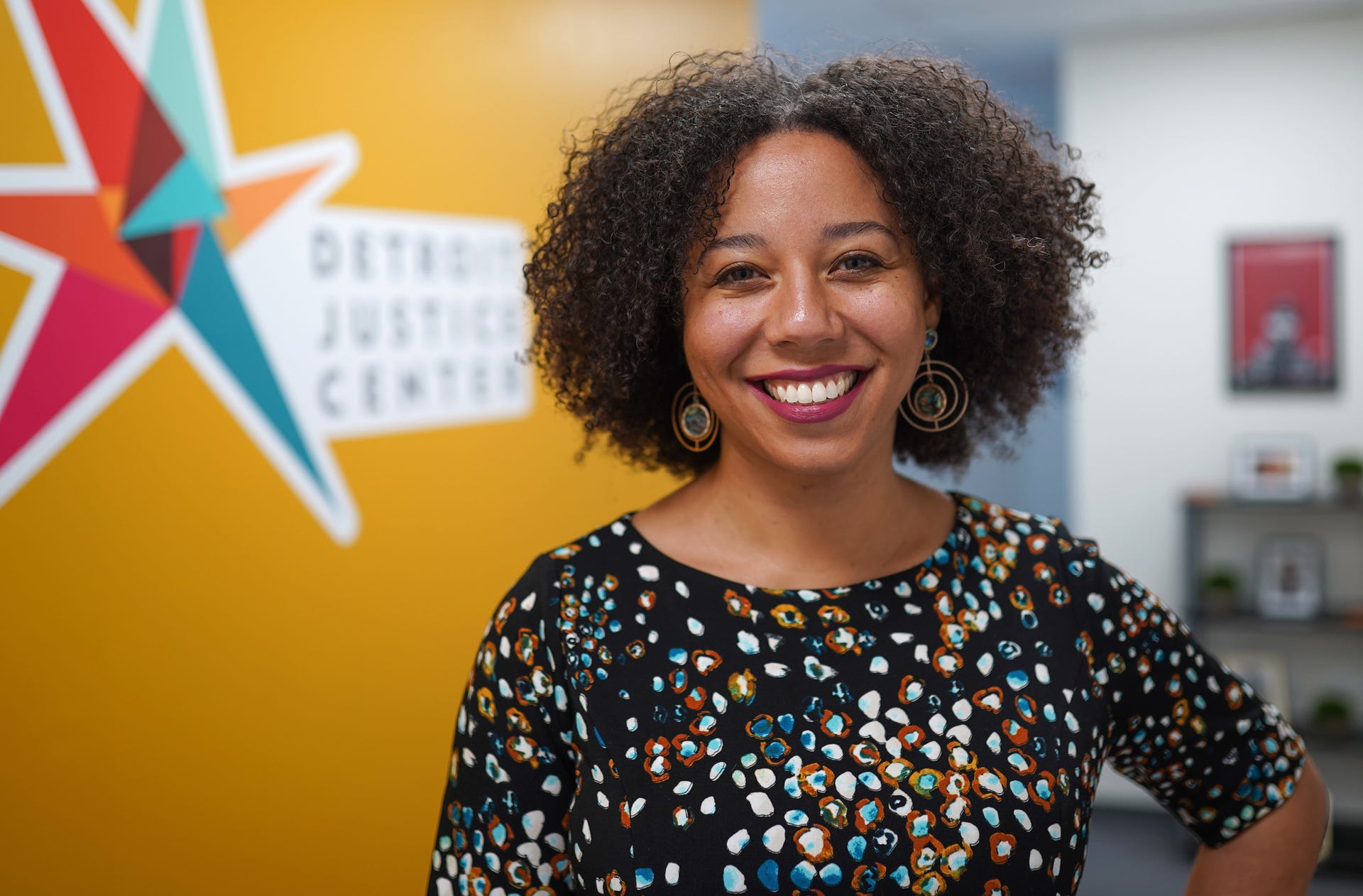
Dear friends,
I moved back to Michigan almost a decade ago to serve families like mine that had been divided by incarceration. At the time, I’d only recently begun to be able to talk about my father’s incarceration without my voice shaking. He went to prison when I was in elementary school, but the trauma of our separation and all that flowed from it still vibrated in my body.
As a new attorney, I represented incarcerated mothers and fathers at risk of losing their parental rights. Together we worked to get their children out of foster care and placed with relatives until they could come home. I also represented parents and caregivers trapped in cycles of police stops, tickets, mounting fines and fees, warrants for missed court dates, nights in jail, evictions, and CPS cases. I came to know Detroiters who were holding families and communities together against all odds: grandparents raising grandchildren after their own sons and daughters were locked up; faith groups renting buses so that kids could visit their parents upstate; fathers running parenting programs inside prisons; and sisters, wives, and mothers—it was always the women—pooling their money to bail loved ones out of jail after police pulled them over again.
I founded the Detroit Justice Center because when local leaders talked about the future of Detroit, throwing around buzzwords like “revitalization” and “renaissance,” they sure weren’t talking about these families. Their grandest plans for the city didn’t include poor Black folks, people who couldn’t afford their water bills, or people displaced by foreclosures—other than figuring out how to police them or price them out. Instead of having a serious conversation about what it would take to build a city where everyone belongs—including the people churning through courts, jails, and prisons—they were intent on spending half a billion dollars on a new jail complex. They were obsessed with installing security cameras and facial recognition software to watch Black people rather than investing in our well-being. We’re still at that crossroads and the stakes are even higher now.
At the Detroit Justice Center, we envision a just Detroit—rooted in solidarity, compassion, and care—and we’re fighting hard alongside our partners to make it real. In the past four and a half years, we have centered the needs of Detroiters impacted by incarceration, providing legal services to more than 1,850 people. We have kept loved ones out of jail and prison, in their homes, and with their families, and removed barriers to finding and keeping work. As part of powerful coalitions, we lifted the ban on food stamps for people with drug convictions, eliminated driver’s license suspensions for nonpayment of fines, and expanded access to criminal record expungement.
We have supported our clients’ freedom dreams, helping to bring three community land trusts and nine worker-owned cooperatives to fruition. We have helped residents negotiate stronger community benefits agreements, equipping them to go toe-to-toe with billionaires and set the terms of development in their neighborhoods. In the early days of the COVID-19 pandemic, we fought to get people out of the Wayne County Jail and won a moratorium on evictions. We continue to represent protesters who took to the streets in the summer of 2020—and who dared to demand a world without police. We launched the Metro Detroit Restorative Justice Network to create more options for families and survivors of serious harm to find healing without relying on courts and incarceration. We have built a divest-invest coalition aimed at shifting money out of policing and prisons and into community health. Now we are poised to move into our new headquarters in the LOVE Building, a social justice hub that will inspire greater collaboration and provide wraparound support for Detroiters.
I could not be prouder of the team we have built at DJC or of the community that has coalesced in the past several years to build power for racial, economic, gender, and disability justice in our city. And so it is with a full heart that I share some exciting and bittersweet news: after seven years of building DJC, I will be transitioning out next May to make way for new leadership and shift us toward a more sustainable shared leadership model.
I am clear that part of being a good founder is knowing when to leave. I want to be proactive and avoid “founder syndrome”—the misguided belief that, as the founder, the organization cannot function without me. My vision of success has always been to build a deep bench and we have that now. I am proud to have grown this team from a budding startup in 2018 to a now 32-person organization with a $4.3 million budget that is a leading force for transformation. Our staff is training the next generation through our internship program and a movement lawyering course at Wayne State Law School. DJC’s Board of Directors and I are completely confident that the organization is ready for this next phase: DJC is a leaderful organization of extraordinary advocates, with more in the pipeline, whom I trust completely to carry the mission forward to the next level.
With this transition, I wanted us to break with the tradition of solo Executive Directors. I have found this leadership structure exhausting, outdated, and unsustainable; it’s often taken 70- or 80-hour workweeks, particularly early on. It’s required me to make DJC my life for the past seven years, which I’ve done gladly—it’s what I signed up for as a founder. But I do not want to ask that of someone else. DJC has matured; we now have a 4-day workweek and I want us to create jobs that can fit within that timeframe.
After a year of thoughtful planning, DJC’s staff and board have agreed to shift to a distributed leadership model with three Co-Executive Directors: one each for strategy, management, and funding and communications. Two-thirds of this structure is already in place with our phenomenal Associate Executive Directors, Felicia Thomas and nikkita oliver. We have launched a search for the Co-Executive Director of Funding & Communications, and I look forward to overlapping with them for a few months to ensure a smooth transition.
We are excited that this new leadership structure will remove a layer of hierarchy within the organization. This new model will allow for more connection between staff and leadership, helping to strengthen our culture and make for more collaborative decision-making. It will also help us model internally what we are working for externally. We help clients create worker-owned cooperatives and community land trusts with collective governance. It’s time we bring some of that creativity in house.
I am also excited to model seasonal leadership that cycles through periods of high energy and activity and rest and reflection. As the Ayni Institute teaches, drawing upon indigenous wisdom: leaders, organizations, and movements have seasons—and it’s important to know which one you’re in. A sustainable movement institution should not depend upon who’s in leadership (and certainly should not depend on the founder). Movement building is intergenerational work, and we need to pace ourselves, mentor new leaders, rest, and renew our energy. On a personal level, I need time to rest and reflect so that I can stay in movement work for the long haul. I am not leaving for another position and don’t have anything lined up—other than a deeply restful sabbatical. I trust there’s someone for whom this is their season, and I’m excited to step aside and make way for them and their energy.
At DJC, what we do is just as important as how we do it. As a team, we talk a lot about how we show up in this work and who we need to be. Out of those conversations, and the pressures of an ongoing pandemic, we have adopted a 4-day workweek, recharge weeks where we pause for collective rest, and wellness stipends. Our internal communications policy asks us to limit work communication to work hours, allowing us to focus on other parts of our lives in the evening and on weekends, and not feel like we’re “on call” 24/7. We provide 100% employer-paid health benefits, ample paid time off, centering days, unlimited COVID sick days to care for ourselves or a loved one, and staff development funds. We are excited to roll out a sabbatical policy for all staff in the new year. Over the past year, we have all been trained in restorative practices so that we are better equipped to move through conflict in healthy ways and to build more honest and trusting relationships. We have a long way to go, but practices like these help us to remain centered and show up for our communities sustainably.
In the coming months, I will share more about our team, the culture we’ve built, our new Co-ED model, and what’s on the horizon. For now, please know how grateful I am for your support of DJC, our clients, our communities, and our boldest freedom dreams. Thank you for your commitment to building a just Detroit where everyone belongs, policing and cages are a distant memory, and we all have what we need to thrive.
With love and gratitude,
Amanda Alexander
Founder & Executive Director

